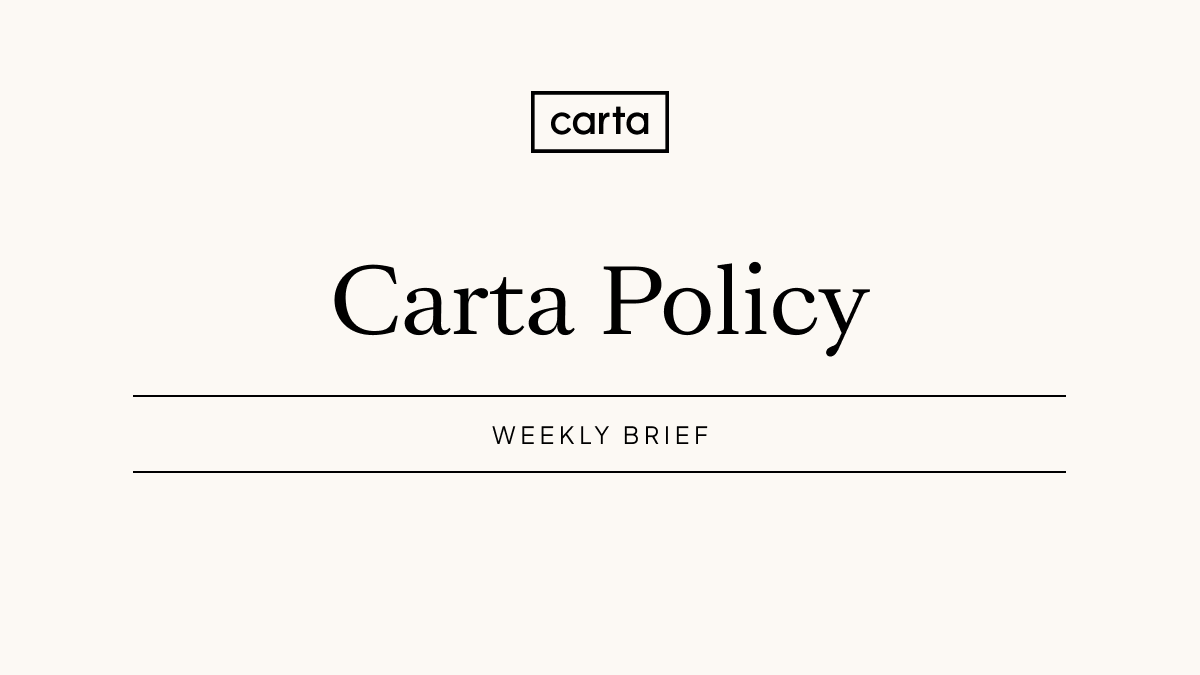Topline
-
Congress clashes over government funding and tax package
-
Spot Bitcoin ETF gains regulatory approval
-
DOL issues final worker classification rules
-
IRS set to propose new rule that will raise taxes for fund managers
-
Carta helps new startups comply with the Corporate Transparency Act as portal goes live
-
New year brings a renewed focus on AI, both at federal and state level
Congress clashes over government funding and tax package
Funding: Government funding deadlines continue to loom over Washington this week. Party leaders have reached a topline deal to fund the government through the rest of the fiscal year, but unrest in the House Republican Caucus continues to threaten its prospects. House Speaker Mike Johnson (R-LA) has only a two-seat margin of control in the chamber, which may force him to choose between bipartisan compromise and the demands of the far-right House Freedom Caucus, which could mean a government shutdown.
Sticking points for far right Republicans range from seeking increased spending cuts, to border security, to a lack of interest in bipartisan compromise. Some in the GOP are already calling for the party to support another short-term stopgap to fund the government into March rather than agree to the bipartisan deal, which seems like the increasingly likely outcome to avoid a government shutdown.
Tax Package: The fate of a long-discussed tax package is also in jeopardy. A deal needs to have broad support among the House and Senate tax writing committees, and leaders are struggling to sell their members on the current parameters of the deal, which notably include:
-
R&D business tax cuts: The framework reportedly includes the revival—through 2025—of three expired business tax provisions from the Tax Cuts and Jobs Act: full expensing of R&D, net interest expensing, and bonus depreciation.
-
Child Tax Credit (CTC): It also contains a partial expansion of the CTC—$1,700 of the $2,000 credit would be refundable to lower-income families in 2024.
What’s next: In the next three weeks, both tranches of temporary government funding expire and the 2024 tax filing season begins. The pressure to pass a funding deal is on, but the obstacles to success remain largely unchanged from before the holidays.
SEC approves first-ever spot bitcoin ETP
In a much-anticipated move, the SEC approved 11 spot bitcoin exchange-traded products (ETPs). The SEC had previously opposed such action for a decade, but last June, the DC Court of Appeals found the agency’s rejection of Grayscale’s application to be “arbitrary and capricious” and required the SEC to revisit the matter. In light of this, Chair Gary Gensler joined with the two Republican commissioners to approve the move, while the Democratic commissioners opposed. Chair Gensler made it clear, however, that his sentiment toward crypto has not changed by highlighting the speculative, volatile nature of the asset and its use in illicit activities like money laundering and terrorist financing in his statement.
Why it matters: The bitcoin ETP approvals mark a substantial victory for the crypto industry. The approvals pave the way for digital assets to become more entrenched in the financial ecosystem and could reignite efforts in Congress to develop a comprehensive crypto regulatory framework and additional authorities to regulate the spot markets. Opponents are also using the opportunity to push for stronger anti-money laundering protections.
Additional scrutiny: The day before the SEC approved the bitcoin ETPs, the SEC’s X account was compromised and an unauthorized tweet was posted announcing the approvals prior to agency action. The SEC was forced to retract the news, which caused the price of bitcoin to move prompting concerns around market manipulation. The SEC will face additional congressional scrutiny around the incident and its own data security, with some congressional leaders calling on the agency to produce a cybersecurity incident report similar to those it requires from the companies it regulates.

Register here for an upcoming event with the Policy Team's Holli Heiles Pandol and AIC's Rebekah Goshorn Jurata.
DOL issues final worker classification rules
The Department of Labor finalized a rule that makes it harder for businesses to classify workers as independent contractors. The rule revamps worker classification detailed in the Fair Labor Standards Act and requires businesses to extend the employee benefits and protections to these re-classified workers. The new rule is set to take effect on March 11.
-
The factors used to determine if a worker can be considered a contractor include (but are not limited to): 1) opportunity for profit or loss, 2) investments by the worker and the potential employer, 3) the degree of permanence of the work relationship, 4) the nature and degree of the employer’s control over the worker, 5) the extent to which the work performed is an integral part of the potential employer’s business, and 6) skill and initiative.
-
The final rule is very similar to the proposal released last year, and it preserves the use of an “economic realities” test that analyzes the totality of the circumstances of the worker–employer relationship. Unlike the Trump era rule, this version does not give greater weight to any specific factors.
What’s next: Several trade associations are already planning to sue the DOL to block the rule, and there will also be efforts in Congress to repeal the rule. In the interim, DOL published FAQs and a compliance guide for small entities.
IRS set to propose new rule that will raise taxes for fund managers
In a recent ruling, the Tax Court determined that being classified as “limited partners” under state laws does not automatically grant fund managers eligibility for the limited partner exemption from federal self-employment tax. As a result, fund managers may face millions of dollars in additional self-employment taxes.
-
This week, an IRS official shared that the agency is actively working to clarify the section 1402(a)(13) limited partner definition and address the lack of “passive investor” status among some state law partners in partnerships. The agency also emphasized that simply being a limited partner under state law is not sufficient to qualify for the exception, as the focus should be on the actual activities of the partners.
-
The IRS also announced its Partnership Self-Employment Tax Initiative with efforts to tackle this issue by increasing audits of wealthy individuals.
What’s next: The increasing litigation surrounding this matter and ramp up in audits highlights the necessity for clear guidance on what it truly means to be a limited partner. The IRS is working on proposed regulations that may include a new functional test for determining limited partner status. Release of proposed rules will trigger the public comment period where stakeholders will have the opportunity to provide input before final guidance is issued.
Carta helps new startups comply with the Corporate Transparency Act as portal goes live
Despite heavy pushback, the new CTA beneficial ownership information (BOI) reporting requirements went into effect on January 1, which put in place substantial new reporting requirements for millions of small businesses and startups. To enable implementation, the Financial Crimes Enforcement Network (FinCEN) released a reporting portal to collect the new required information.
Treasury Secretary Yellen gave a speech on Monday praising the rule, and noted that FinCEN had received over 100,000 filings since the portal opened on January 1. Yellen doubled down on the need for the new requirements, citing that the rule is critical in ensuring the integrity of our financial system and to advance global efforts against illicit finance and money laundering.
Companies created before January 1, 2024 are required to file their BOI by January 1, 2025. Companies formed during 2024 will have 90 days to file their BOI and those created in 2025 and beyond will have 30 days to file.
What’s next: Carta is helping founders comply by offering a f ree CTA compliance solution as soon as the new regulations go into effect on January 1, 2024. Our CTA compliance solution is embedded in Carta’s free Launch plan, so startups (and their counsel) can use it even if the company has not raised any financing.
New year brings a renewed focus on AI, both at federal and state level
The House Financial Services Committee announced the creation of a bipartisan Working Group on Artificial Intelligence, led by Digital Asset, Financial Technology and Inclusion Subcommittee Chairman French Hill. The group will explore how AI is impacting the financial services and housing industries, including the development of new products and services, fraud prevention, compliance efficiency, and the enhancement of supervisory and regulatory tools.
This announcement follows a contentious hearing earlier this week, where the Senate Judiciary Committee questioned copyright infringement with AI training data, and considered whether tech companies should be paying for access to certain training data, such as content publicly available in the media. There was pushback, as it was noted that requiring firms to pay for the data favors the big firms that have the resources to pay, and would create enormous costs for startup AI firms that could diversify the marketplace.
And not only is AI policy top of mind for federal policymakers, but several states have started the year with a focus on AI policy. This week, New York Governor Kathy Hochul announced a proposal that would direct $275 million of state funds to the creation of an AI research center that would be a public-private partnership aimed at making New York a key player in artificial intelligence research.
Why it matters: AI will continue to be a major policy topic in 2024, and it appears policymakers at both the state and federal level are still in the information gathering stage.
News to know
-
DOL investment advice regulations criticized by House Financial Services Committee. In October, the Department of Labor announced a plan to subject more investment advisers to the fiduciary standard, which imposes requirements to ensure those professionals are acting in their client’s best interest. Both Republicans and Democrats slammed the rule in a hearing this week, noting that the rule will limit popular investment opportunities for millions of Americans.
-
SEC appoints Stacey Bowers as Small Business Advocate. She will lead the SEC’s Office of the Advocate for Small Business Capital Formation (OASB), which is an independent office that was established in January 2019 to advance the interests of small businesses and their investors in the capital formation process.
-
IRS expands business tax account access to S corporations and partnerships. The IRS announced the launch of a new online self-service tool for businesses that expands the business tax account capabilities and eligible entity types. On this portal, individual partners of partnerships and individual shareholders of S corporation businesses are now eligible for a business tax account in addition to sole proprietors.
Upcoming events
-
House Committee on Small Business hearing: Pathways to Success: Supporting Entrepreneurs and Employees with Disabilities - January 17 at 7:00 a.m. PT / 10:00 a.m. ET
-
SEC Chair Gary Gensler participating in a fireside chat with Public Citizen - January 17 at 10 a.m. PT / 1:00 p.m. ET
-
House Committee on Small Business hearing: Unleashing Main Street's Potential: Examining Avenues to Capital Access - January 18 at 7:00 a.m. PT / 10:00 a.m. ET
-
House Financial Services Committee hearing: Oversight of the SEC’s Proposed Climate Disclosure Rule: A Future of Legal Hurdles - January 18 at 7:00 a.m. PT / 10:00 a.m. ET
-
Carta Policy Live - January 19 at 9:00 a.m. PT / 12:00 p.m. ET
-
Carta event: Increasing Regulatory Scrutiny and What It Means for PE - January 25 at 12:00 p.m. PT / 3:00 p.m. ET
-
Carta Innovators Summit - February 13 at 10 a.m. PT / 1:00 p.m. ET
-
FTC Tech Summit - 9 a.m. PT / 12:00 p.m. ET

